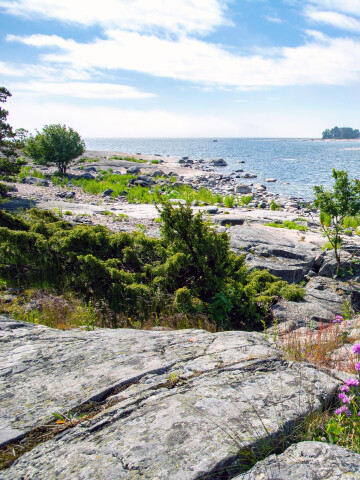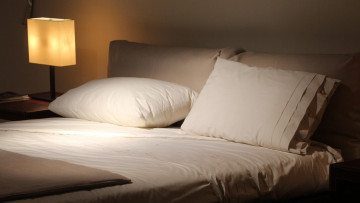
FUI-Bloggen
FUI är förkortningen för forskning, utveckling och innovation. I FUI-bloggen skriver Yrkeshögskolan Novias personal om sitt jobb, forskning, projektverksamhet och andra betraktelser.
Blogginlägg som är granskat av Novias redaktionsråd är utmärkta med nyckelordet "Granskat inlägg".
Vi följer CC-BY 4.0 om inget annat nämns.
Sleep Tourism – A major trend in 2025

“The shorter the sleep, the shorter the life” is a statement revealing the importance of quality and regular sleep in human life. When work was more physical and no relentless connectivity existed, people did not have sleeping problems to the same extent as today. Lack of good sleep routines, stress, and online entertainment available 24/7 contribute to increased insomniacs and poor sleep quality. (Erdekian & Hopper, 2024; Berg, 2023) Good sleeping habits are crucial for human wellbeing (e.g. Pallesen et al., 2016; Yildiz, 2024). It has been estimated(,) that over one in three adults in the US have chronic sleep disorders (Thomann, 2024; Berg, 2023). In Finland, it has been estimated that up to 15 percent of the adult population suffers from severe insomnia (Duodecim, 2023). Insomnia is especially common among people working shift and long hours in managerial positions, which a growing number of people do as many services today have long opening hours from early morning to late evening. Hospitals are offering help with sleep orders for adults with severe problems, but people who are not there yet, but still need some help, could rely on the new tourism trend for 2025 - sleep tourism.
What is sleep tourism?
Tourists are increasingly looking for wellbeing services during their holidays (Payne, 2024; Thomann, 2024). Different retreats such as detox (living without your mobile) and yoga holidays have been around for some years. The newest concept is sleep tourism, which puts a strong emphasis on having a good sleep. Sleep tourism aims at offering tourists high-quality sleep for them to be able to come back from the holiday well-rested and full of energy. As an article in the Swedish newspaper Expressen explains, “sleep tourism is a growing trend where tourists choose a destination based on where they can get the most rest. The aim is to get rid of everyday stress, gain better sleeping habits and to reach a deeper recovery” (Olsson, 2024). Thus, instead of filling the holiday with an endless number of activities and cultural programs, a sleep tourism holiday is about getting as much rest as possible.
As a concept, there are different approaches to sleep tourism. Sleep tourism can be about meditation to calm down the nerve system, soundproof rooms, leaving the mobile and computer at home, or hotel rooms with no daylight. Service providers offering sleep tourism experiences must offer comfortable beds, duvets, and pillows. (Billerbeck 2025; Payne, 2024) In a Finnish research context, the concept of sleep tourism has also referred to offering unique and different places to sleep such as igloos, houses up in threes, or glamping (Arsovski, 2023). Most commonly the sleep tourism concept is used in discussions related to well-being tourism and with a special focus on developing an optimal sleeping environment for the tourists.
Where to go for a sleep tourism holiday?
Worldwide hotels are currently offering retreats focusing on excellent conditions for sleep. The trend is(,) that wellness is seen in a holistic way. Some hotels also offer specific treatments to improve sleep quality such as massages, sound and aromatherapy, yoga, and meditation. Trained sleep coaches can help customers (to) relax and give recommendations on how you can fall asleep effortlessly. Sleep analyses are also carried out in some hotels in order to get to the bottom of the cause of the lack of sleep. (Erdekian & Hopper, 2024)
As wellness tourism in general, sleep tourism is mostly related to luxury hotels and spas in destinations such as Ibiza and Switzerland (Berg, 2023). But also, VisitSweden promotes the unique natural environment of Sweden providing a lot for people longing for a good and restorative sleep. The concept of 'Swede dreams' has been introduced to the market. (VisitSweden, 2025). The Swede dreams’ concept highlights factors such as a natural darkness during the autumn and winter, cool outdoor temperatures creating a perfect sleeping environment, and clean air combined with peaceful nature. A remote location is consequently seen as a perfect destination for a sleep retreat.
Do sleep retreats offer real value?
A solid eight-hour sleep has become a sought-after luxury (Bennett, 2025). As humans, we are constantly overstimulated; we receive text messages and email notifications, and we listen to music from Spotify while reading and during walks. For most people, it is difficult to leave the phone out of reach. (Berg, 2023) Our brains are overstimulated. According to research, people who sleep less than 7-8 hours have a lower quality of life compared to individuals who sleep more (Yildiz, 2024). For many, a sleep retreat is worthy, simply taking the time to improve sleep and to gain (a getting) a better understanding of how to improve the quality of sleep. In the end, it is the quality rather than the quantity of sleep that is important. (Ramsay, 2024)
It has been estimated that sleep tourism will be a $400 billion industry by 2028. Sleep is the key to good health, without sleep your performance in all aspects of life will suffer. Without proper sleep, there is even a risk for depression and weight gain due to hormonal effects. Thus, finding strategies to solve sleep-related challenges is something people should prioritize. (Payne, 2024) A sleep retreat is however, not always the solution. According to a study by Pallesen et al (2016), people slept somewhat poorer in hotels than at home, but the sleep generally improved with the length of the stay. A fact is though that people with insomnia, won’t get help from a sleep holiday in the long run. Sleep problems are created through everyday life. Thus, people need to make changes in their lifestyle and rely on cognitive behavioral therapy for insomnia (CBTI) to get help (in the) long term. (Erdekian & Hopper, 2024)
Could sleep retreats become a niche for peripheral destinations in Finland?
Already 10 years ago a sleep retreat concept was tested at Manor Hotel Haikko in Porvoo . Customers were able to buy a package that offered a follow-up of their sleep through a monitor. Apart from that it seems like rather few companies have seen the potential of sleep retreats. Destinations like the Turku archipelago could have (a) huge potential here as the off-season is quiet and the surrounding nature could offer a place to calm down from a hectic everyday life. It would be important though to invest in (the) accommodation facilities and especially in good beds and pillows. Too often, for instance, pillows are standardized, and what is a suitable pillow for one person is not necessarily for another. Whether people would be prepared to pay extra for a sleeping retread as a unique experience, service providers would need to learn more about the requirements of the customers to make sleep holidays into an appealing product.
References
Arsovnski, N. ( 2023). Mitä unimatkailu on: mikään ei häiritse untasi näissä hotelleissa. https://citymagazine.si/fi/mika-on-uni-matkailu-naissa-hotelleissa-mikaan-ei-hairitse-nukkuasi/
Bennett, E. (2025). Why sleep tourism is the latest travel trend to know about. https://www.nationalgeographic.com/travel/article/what-is-sleep-tourism-and-why-is-it-on-the-rise
Berg, R. (2023) Sleep Tourism: 10 Wellness Destinations to Visit for a Good Night’s Sleep . https://www.forbes.com/sites/ronaberg/2023/03/31/sleep-tourism-10-wellness-destinations-to-visit-for-a-good-nights-sleep/
Billerbeck (2025). Sleep tourism – holidays for relaxed sleep. https://billerbeck.shop/blog/en/sleep-tourism-holidays-for-relaxed-sleep/
Duodecimin (2023). Unettomuus. https://www.kaypahoito.fi/hoi50067
Erdekien, A & Hopper, G. (2024). Sleep tourism is the wellness trend we've all been waiting for. https://www.cntraveller.com/article/sleep-tourism
Olsson, D. (2024). Sömnturism en av de nya resetrenderna inför 2025. https://www.discoveringtheplanet.com/somnturism-en-av-de-nya-resetrenderna-infor-2025/
Pallesen, S., Larsen, S. & Bjorvatn, B. (2016) “I Wish I'd Slept Better in That Hotel” – Guests’ Self-reported Sleep Patterns in Hotels, Scandinavian Journal of Hospitality and Tourism, 16:3, 243-253, https://doi.org/10.1080/15022250.2015.1074938
Payne, H. (2024). Hotelexecutive: The Rise of Sleep Tourism. https://www.discoveramerica.fi/uutiset.html?a100=235600
Ramsay, L. (2024). Sleep tourism will be one of 2025's biggest travel trends — here’s why you should book a sleep retreat too. https://www.tomsguide.com/wellness/sleep/what-is-sleep-tourism
Thomann, L. (2024). Sleep Tourism Is One of 2025's Biggest Travel Trends—and It Will Totally Change How You Vacation. https://www.realsimple.com/sleep-tourism-is-the-2025-travel-trend-you-should-try-8745352
VisitSweden (2025). 'Swede dreams' – discover Scandinavia's secrets to restful nights. https://visitsweden.com/what-to-do/spa-wellness/sleep-tourism/
Yildiz, S. (2024). Sleep tourism: Has “sleeping” become a new purpose in tourism? https://dergipark.org.tr/tr/pub/asead/issue/87861/1517161
Texten har granskats och godkänts av Novias redaktionsråd 10.4.2025.
![]()
FUI-Bloggen
Blogginlägg som är granskat av Novias redaktionsråd är utmärkta med nyckelordet "Granskat inlägg".
Vi följer CC-BY 4.0 om inget annat nämns.
Ansvarsfriskrivning: Författaren/författarna ansvarar för för fakta, möjlig utebliven information och innehållets korrekthet i bloggen. Texterna har genomgått en granskning, men de åsikter som uttrycks är författarens egna och återspeglar inte nödvändigtvis Yrkeshögskolan Novias ståndpunkter.
Disclaimer: The author(s) are responsible for the facts, any possible omissions, and the accuracy of the content in the blog.The texts have undergone a review, however, the opinions expressed are those of the author and do not necessarily reflect the views of Novia University of Applied Sciences.
Posta din kommentar
Kommentarer
homepage 3 juni 2025 00:50 (9 månader sen)
Good knowledge Kudos.
homepage
Truly lots of helpful advice.
casino en ligne
This is nicely said. .
casino en ligne
Incredible many of valuable facts!
casino en ligne
Many thanks! Plenty of posts!
casino en ligne
You said this well.
casino en ligne
Truly a good deal of very good data!
casino en ligne
You mentioned that fantastically!
casino en ligne
Kudos, I appreciate this!
casino en ligne
With thanks, Plenty of facts.
casino en ligne
Inga har kommenterat på denna sida ännu